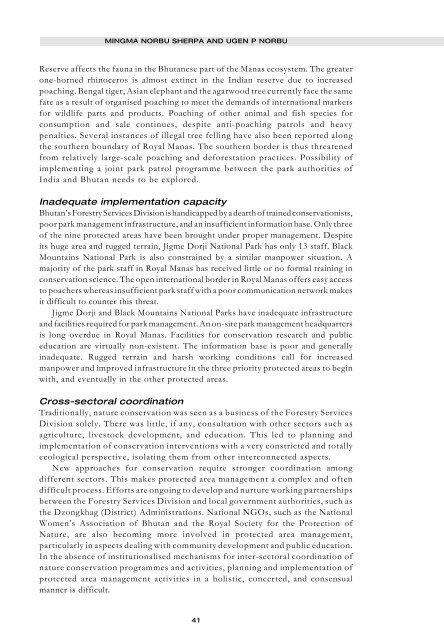Parks - IUCN
Parks - IUCN
Parks - IUCN
You also want an ePaper? Increase the reach of your titles
YUMPU automatically turns print PDFs into web optimized ePapers that Google loves.
MINGMA NORBU SHERPA AND UGEN P NORBU<br />
Reserve affects the fauna in the Bhutanese part of the Manas ecosystem. The greater<br />
one-horned rhinoceros is almost extinct in the Indian reserve due to increased<br />
poaching. Bengal tiger, Asian elephant and the agarwood tree currently face the same<br />
fate as a result of organised poaching to meet the demands of international markets<br />
for wildlife parts and products. Poaching of other animal and fish species for<br />
consumption and sale continues, despite anti-poaching patrols and heavy<br />
penalties. Several instances of illegal tree felling have also been reported along<br />
the southern boundary of Royal Manas. The southern border is thus threatened<br />
from relatively large-scale poaching and deforestation practices. Possibility of<br />
implementing a joint park patrol programme between the park authorities of<br />
India and Bhutan needs to be explored.<br />
Inadequate implementation capacity<br />
Bhutan’s Forestry Services Division is handicapped by a dearth of trained conservationists,<br />
poor park management infrastructure, and an insufficient information base. Only three<br />
of the nine protected areas have been brought under proper management. Despite<br />
its huge area and rugged terrain, Jigme Dorji National Park has only 13 staff. Black<br />
Mountains National Park is also constrained by a similar manpower situation. A<br />
majority of the park staff in Royal Manas has received little or no formal training in<br />
conservation science. The open international border in Royal Manas offers easy access<br />
to poachers whereas insufficient park staff with a poor communication network makes<br />
it difficult to counter this threat.<br />
Jigme Dorji and Black Mountains National <strong>Parks</strong> have inadequate infrastructure<br />
and facilities required for park management. An on-site park management headquarters<br />
is long overdue in Royal Manas. Facilities for conservation research and public<br />
education are virtually non-existent. The information base is poor and generally<br />
inadequate. Rugged terrain and harsh working conditions call for increased<br />
manpower and improved infrastructure in the three priority protected areas to begin<br />
with, and eventually in the other protected areas.<br />
Cross-sectoral coordination<br />
Traditionally, nature conservation was seen as a business of the Forestry Services<br />
Division solely. There was little, if any, consultation with other sectors such as<br />
agriculture, livestock development, and education. This led to planning and<br />
implementation of conservation interventions with a very constricted and totally<br />
ecological perspective, isolating them from other interconnected aspects.<br />
New approaches for conservation require stronger coordination among<br />
different sectors. This makes protected area management a complex and often<br />
difficult process. Efforts are ongoing to develop and nurture working partnerships<br />
between the Forestry Services Division and local government authorities, such as<br />
the Dzongkhag (District) Administrations. National NGOs, such as the National<br />
Women’s Association of Bhutan and the Royal Society for the Protection of<br />
Nature, are also becoming more involved in protected area management,<br />
particularly in aspects dealing with community development and public education.<br />
In the absence of institutionalised mechanisms for inter-sectoral coordination of<br />
nature conservation programmes and activities, planning and implementation of<br />
protected area management activities in a holistic, concerted, and consensual<br />
manner is difficult.<br />
41

















